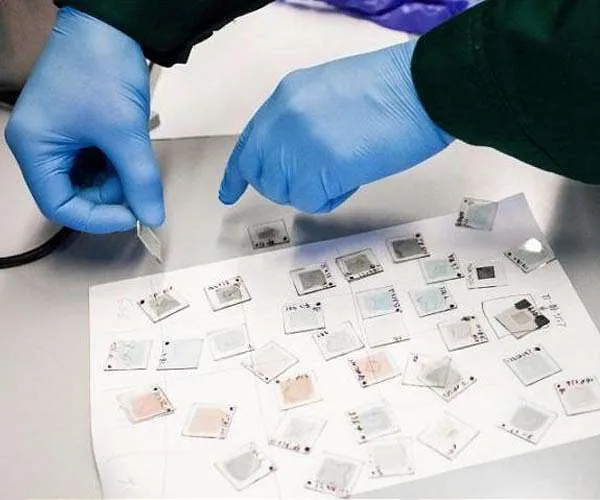Outstanding organic solar cells' efficiency attained by using new technology
- Organic solar components with the self-assembling molecular-thin layer (SAM) of hole-transporting product, the technology, which was made use of in producing a record-breaking tandem solar cell, accomplished 18.4 power conversion performance.

The innovation of Lithuanian drug stores operating at Kaunas University of Technology (KTU), advertised by numerous international firms showed functional and also appropriate to various solar technologies.
Organic solar cells are made from usual organic components such as carbon, hydrogen, nitrogen, fluorine, oxygen, and also sulphur. Their raw materials are cheap, bountiful, as well as can be conveniently recycled. Although the organic solar (OPV) elements are lighter, more versatile and less costly to create, their effectiveness still falls behind that of various other photovoltaic or pv technologies, consisting of silicone, perovskite as well as tandem solar cells. As well as yet, this facet may quickly change.
At the end of 2018, a team of Lithuanian chemists from Kaunas University of Technology synthesized a material, which self-assembles right into a molecule-thick layer, also known as monolayer, can cover a variety of surfaces and also feature as a hole-transporting layer in a solar component.
Until recently, the self-assembling monolayers (SAMs) have been utilized to generate record-breaking perovskite/silicon and CIGS/perovskite tandem solar cells. Nonetheless, the technology likewise proved very effective - getting to virtually record-breaking 18.4 power conversion - when made use of in an organic solar cell, produced by the group of scientists headed by Professor Thomas Anthopoulos at the KAUST University in Saudi Arabia.
"We made some modifications in the material used in SAM formation to tailor it for organic solar components. However, our technology, using an advancement method towards photovoltaic or pv aspects' manufacturing remains the exact same: the surface area is dipped into a service and also a molecule-thick semiconductor layer is formed. The technology is cheap, efficient and also versatile", says Dr Artiom Magomedov, the co-author of the innovation.
As the materials synthesized by KTU chemists are currently commercialised as well as openly offered in the market for research study groups and also companies all over the world, the discovery continues to progress the development of photovoltaic or pv technologies.
"Last year, we noticed a short article published by the researchers from KAUST, where they described the achieved extremely high efficiency of an organic solar cell while using our SAMs. We got in touch with the researchers and also used to team up in enhancing the capacities of the product. Because of the pandemic limitations, all teamwork was remote - we sent out the synthesised products by post as well as our coworkers in Saudi Arabia built the organic solar cells as well as gauged their homes", explains Dr Magomedov.
The organic solar cell using Br-2PACz molecule-thin finishing as a hole-transporting layer attained a power conversion effectiveness of 18.4 percent, which is presently among the highest possible in OPV technologies. Furthermore, the electrode created was chemically stable, and after removal of the SAM, it could be reused and reused to create fresh highly-performing OPV cells.
The scientists emphasise that making use of comparable SAMs could be possibly prolonged in various other applications including light-emitting diodes, photodetectors or organic transistors. According to Dr Magomedov, all various solar technologies, which are presently being established, will certainly find their specific niches on the market - as OPV cells are lighter, can be made transparent as well as adaptable, can be made use of for billing drones, house electronic devices, for interior photovoltaics. Presently, no OPV aspects are mass-produced.
"The semiconducting properties of organic aspects are less than those of non-organic products. For that reason, the attained performance outcomes are extremely outstanding for everybody working in the field. After the publication, a Swedish business "Dyenamo" has currently acquired the licence to produce our products tailored for the organic solar aspects, as they see the capacity of this technology", states Professor Vytautas Getautis, the Head of the KTU research group behind the development.
Also read

